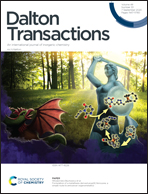In situ study of the synthesis of thorite (ThSiO4) under environmental representative conditions†
Abstract
Thorite, (ThSiO4) with a zircon type structure, is one of the most abundant natural sources of thorium on Earth. Generally, actinides are known to form nanoparticles in silicate medium, though no direct link between those colloids and the crystalline form of thorite was evidenced until now. Here we show the formation of thorite from colloids and nanocrystalline structures under experimental conditions close to environmental pH and temperature. Through in situ small and wide angle X-ray scattering (SWAXS) measurements, colloids with a few nanometers in size were first evidenced at a low reaction time. These colloids have elongated shapes and finally tend to aggregate after their size has reached 10 nm. Once aggregated, the system goes through a maturation step, ending with the emergence of nanocrystallites as thorite zircon structures. This maturation step is longer when the reaction temperature is decreased which highlights the kinetic considerations. These results have potential implications on the paragenesis of Th mineral deposits and also in the behaviour of Th and, by analogy, tetravalent actinides in the environment. The significant characteristics of this work are that Th-silicate colloids were demonstrated at low temperatures and a near neutral pH with long-term stability and a morphology in favor of high mobility in groundwater. If these species are formed in more diluted media, this could be problematic owing to the spreading of Th and, by analogy, other tetravalent actinides in the environment.



 Please wait while we load your content...
Please wait while we load your content...